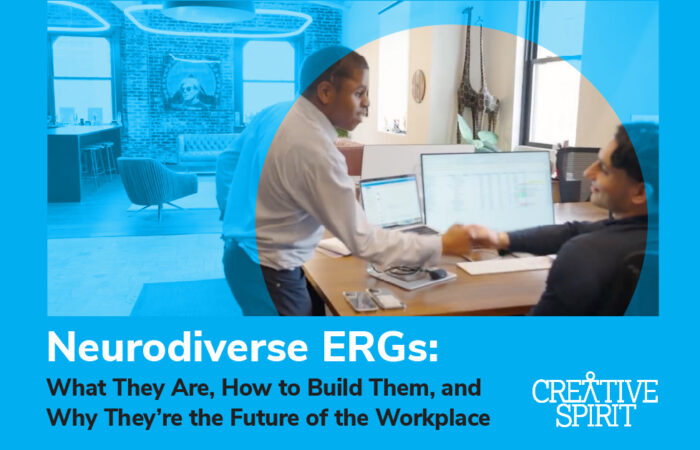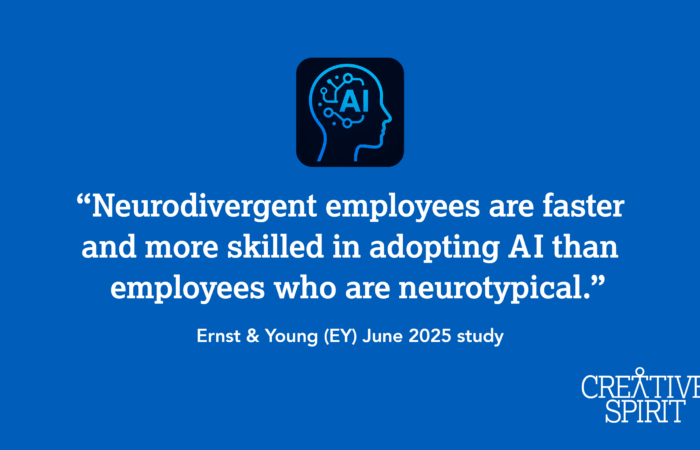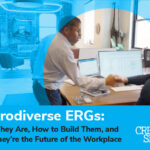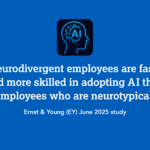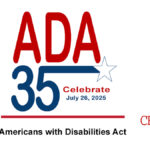By Menachem Rephun, Communications Manager, Creative Spirit
For many neurodivergent professionals, “masking” is an all too familiar term. With workplaces still being designed largely by and for people who are neurotypical, masking (or suppressing or hiding neurodivergence), can often feel like a necessity. Masking can include behaviors like people-pleasing, holding back from expressing unique ideas, rehearsing socially acceptable responses to avoid saying the wrong thing, stifling stims, and monitoring movements. Add in the fact that ableism and discrimination unfortunately still persist, and the pressure to mask is raised even further. In short, the need for masking demonstrates that society has not yet learned to fully understand, accept, or appreciate people with neurological differences.
“For me, a person with ADHD, it happened in high school,” Kate Nelson, Mental Health Editor for VeryWell Mind, writes. “I was happy with who I was, and then one day in 10th grade, my friends all told me they didn’t want to be friends with me anymore because of how weird, spacey, and blunt I was.” Nelson adds that it took her “most of the following decade to get more comfortable with my authentic self, but in many situations, the mask remains.” It’s not surprising that constantly struggling to hide being neurodivergent has a slew of negative consequences, including stress, anxiety, and burnout. Nelson writes that many workplace rules and expectations make blending in even harder. “Employees are generally expected to exercise tactful diplomacy at work,” she observes. “This means choosing words carefully, hiding emotional reactions, minding workplace politics, and reading between the lines. Small talk is also a must.”
Although bias and ableism still exist, there are reasons to be optimistic. One notable fact is that appreciation and respect for the talents and skills of neurodivergent professionals are growing. Major companies like Microsoft, Google, SAP, and others have introduced programs to onboard neurodivergent employees. Recent data also shows that over 50% of Gen Z, the young adults shaping the current and future workforce, identify as neurodivergent. Employers and hiring managers can drive these positive trends forward by providing reasonable accommodations, supporting Employee Resource Groups (ERGs), addressing their own unconscious biases and bias within their hiring processes, and promoting awareness and respect for all employees. There are also numerous resources and strategies neurodivergent employees can utilize to build confidence, lower stress, and bring their authentic selves to the workplace.
Practical Steps to Overcome Masking and Live Authentically
It’s important to note that for people who are neurodivergent, masking is not always a conscious choice, but can occur unconsciously as a reaction to societal norms and pressures. Neurodivergent employees should also know that masking isn’t something to feel embarrassed or ashamed of, either.
“Most, if not all, neurodivergent people mask throughout some or all their lives,” La Concierge Psychologist points out in their article “Seven Steps to Unmasking as a Neurodivergent Person.” The article notes that many neurodivergent individuals have “been told they are too much, their behaviors are too weird, they need to behave more ‘normally’, or that they will only succeed if they learn to fit in.” One strategy to help with “unmasking”, the article writes, is for neurodivergent people to think about what they’re like when they’re alone, i.e. when they’re being their authentic selves, without any anxiety over judgment or misunderstanding from others.
“If you think about how you feel when you’re alone and relaxed,” the essay explains, “it will help you figure out what your unmasked self might look like, and help you set goals for your unmasking process.” Finding a like-minded, neurodivergent community to become a part of can also alleviate the pressure to hide being neurodivergent. For those who have autism spectrum disorder (ASD), dyslexia, ADHD, or another diagnosis, surrounding yourself with other neurodivergent individuals is one of the best and most effective ways to encourage and develop authenticity and confidence. These communities can be everything from Facebook groups to ERGs, to Discord chats, or subreddits. Regardless of the forum, the most crucial aspect is finding friends and peers who can affirm one’s neurodivergent identity in a healthy, positive way.
For those who aren’t ready to fully disclose being neurodivergent, Kate Nelson suggests supplementing a healthy coping mechanism in place of the masking behavior. Some examples are using a stress ball or wearing headphones without music to resist the urge to talk too much (both methods used by one of the neurodivergent professionals mentioned in her essay). “It’s little adjustments like these and the reframing of behaviors that can encourage a mindset of self-acceptance,” Nelson writes. “As neurodivergence continues to become more normalized, your colleagues might just be more accepting of your unmasked behavior than you’d expect.” Other coping mechanisms that can serve as a healthy alternative to masking include deep breathing and meditation, listening to music, and physical exercise. However, as TransitionsUSA.org writes, the most valuable and important coping skill is being able to recognize when you’re feeling overwhelmed, and being equipped with the self-advocacy skills to remove yourself from that situation.
How Employers Can Reduce the Need for Masking
Of course, the responsibility to overcome masking doesn’t fall exclusively on employees who are neurodivergent. Employers, neurotypical coworkers, and hiring managers can reduce masking as well. “Employers have the power to reduce the need for masking by nurturing inclusive cultures,” Dr. Ludmila N. Praslova writes for Psychology Today, “where all employees—neurodivergent or neurotypical, introverted or extroverted—feel valued and supported.” Employers, she writes, should take the initiative to ask neurodivergent employees what does and doesn’t work for them. Doing so shows that neurodivergent employees are fully valued and appreciated, reducing the pressure that leads to masking. Employers should also normalize flexibility, allowing remote work, flexible hours, and/or quiet spaces as an option. Thirdly, Praslova advocates for evaluating employees based on outcomes, rather than by personality or mannerisms. Employers can also use a system where neurodivergent employees are paired with mentors or allies who can offer guidance and advocacy.
Transparency in leadership can create an environment where neurodivergent employees feel secure and comfortable being their authentic selves. Transparency means a commitment to open communication, and establishing clear expectations and goals. Being upfront about challenges, learning curves, and mistakes can go a very long way in building respect and trust from employees. It also creates consistency that allows neurodivergent employees, and all employees, to navigate their roles with greater confidence and reduced stress.
In her essay, Praslova encourages neurodivergent employees not to view unmasking as failing or giving up. On the contrary, it should be viewed as an opportunity to reclaim one’s energy, well-being, and creativity. “[Unmasking] is being professional in your way,” she writes. “It allows you to shift from survival mode to a place where you can thrive, bringing your strengths and insights to work without the constant stress.” By developing a workplace culture where neurodiversity is celebrated, employers can make masking a thing of the past, helping neurodivergent employees take pride in their identities, skills, and talents.
Sources
https://www.verywellmind.com/kate-nelson-5086922
https://laconciergepsychologist.com/blog/unmasking-neurodivergent-person/

